Jaguar I-Pace revealed – a four-wheel-drive electric car at the front of the clean air revolution
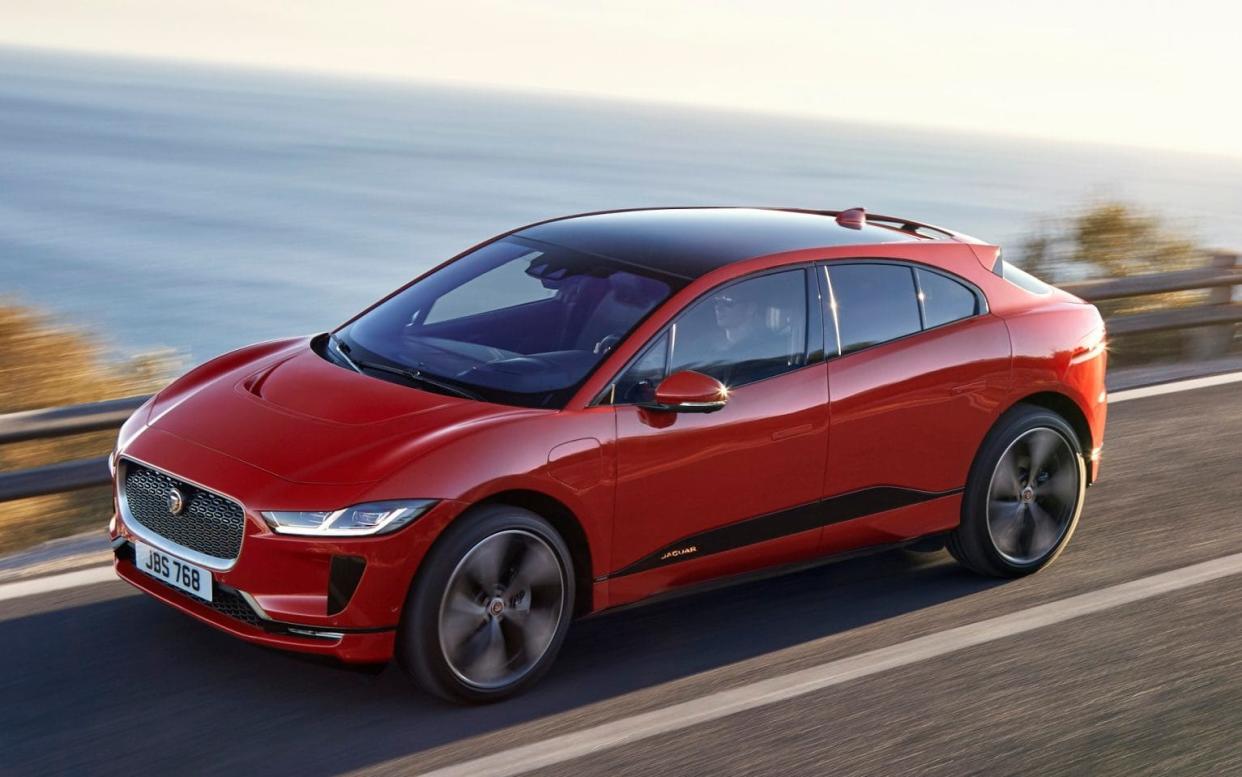
Jaguar has launched the long-awaited I-Pace, a new battery-powered car described by its manufacturer as “the electric vehicle drivers have been waiting for”.
Priced from £63,495 and available to order now, the I-Pace is a five-seat EV with an eye-catching design and claimed performance figures that match those of a sports car. It’ll reach 60mph in 4.5 seconds, it has a total power output of 395bhp, and a supposed range of up to 298 miles – though we’ll believe this when we experience it for ourselves.
The new Jaguar I-Pace electric SUV, in pictures
Inside, the awkwardly-named I-Pace has a new Jaguar infotainment system called “Touch Pro Duo”, as well as a clever navigation system that takes geography and driving style into account when calculating the range left in the battery. Jag describes the I-Pace as a mid-sized SUV; it has two seats in the front and three in the back, followed by 656 litres of boot space.
Jaguar describes its new model as a “concept car made real”, adding that “nothing else will look or drive like the Jaguar I-Pace”. It’s still a pretty conventional shape, but the all-electric powertrain has enabled the car’s designers to optimise it for cabin space rather than the mechanics of an internal combustion system.
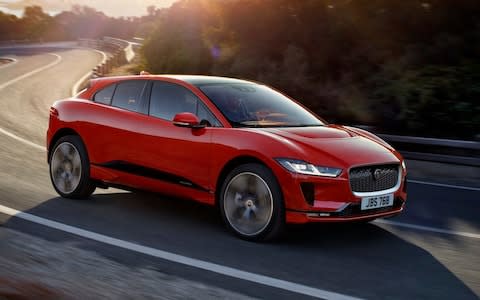
“The I-PACE’s electric powertrain offered us unprecedented design freedom,” said Jaguar’s director of design Ian Callum.
“Starting with a clean sheet enabled the dramatic cab-forward profile, unique proportions and exceptional interior space – yet it is unmistakably a Jaguar. We wanted to design the world’s most desirable EV, and I’m confident we’ve met that challenge.”
That short, squat front end is apparently influenced by Jaguar’s C-X75 concept car, which was unveiled at the 2010 Frankfurt Motor Show. The front of the I-Pace certainly bears a passing resemblance to a supercar (though this impression vanishes at around the A-pillars) and a drag coefficient of 0.29Cd means that it’s aerodynamically comparable too.
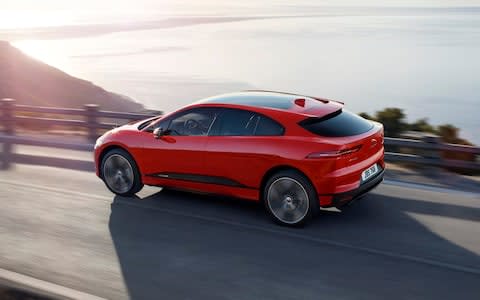
Whether it delivers the performance to match its sporty looks remains to be seen, but on paper the I-Pace impresses. It has two 197bhp electric motors, one on each axle for four-wheel-drive stability, which between them generate 395bhp and 512 lb ft of torque. Our experience with electric cars suggests that the ‘oomph’ of this system will be impressive, especially away from the lights at low speed.
“The I-PACE is a true Jaguar, delivering driver-focused dynamics with exceptional ride, handling and refinement,” said Jaguar’s chief engineer Mike Cross.
“With all-wheel drive technology and 400PS, our first electric vehicle delivers instantaneous acceleration on all road surfaces, in all conditions.”
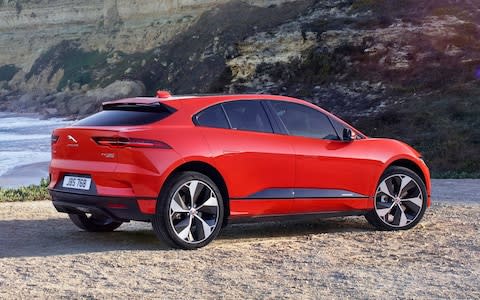
The heavy 90kWh battery is mounted low in the car to mitigate its effect on handling and agility - Jaguar is positioning this model as a driver’s car, which never really works in the context of an SUV but which is a sentiment we welcome anyway. The battery consists of 432 Lithium-ion cells, which are kept near their optimum temperature using a heat pump, and can be charged up to four-fifths capacity as little as 45 minutes with the most powerful charger. At your house, however, that process will take ten hours.
“For I-PACE customers – fuel stations are a thing of the past,” explained Ian Hoban, vehicle line director. “After overnight charging they’ll wake up every morning with a ‘full tank of fuel’!”
But it’s charging time, combined with the availability of infrastructure and the range of the batteries, that will be the main obstacle to I-Pace ownership. In almost every sense this new Jag sounds like an impressive vehicle, but buyers will either need a driveway or reliable access to infrastructure (or both) in order to use such an EV on a daily basis.
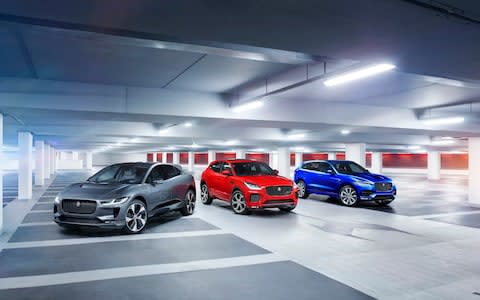
The roll-out of charging stations in the UK has been haphazard, and ultimately the I-Pace offers the same day-to-day practicality as internal combustion cars that cost half as much. It’s telling that 80 per cent of I-Pace deposits have been taken from the South East of the UK.
For those able to incorporate an EV into their lives, however, the I-Pace looks set to become a new benchmark in electric family mobility. An eight-year battery warranty, financial benefits that come with zero-emission cars, and the promise of low running costs makes this new Jaguar an attractive machine. What’s more, the I-Pace should be eligible for a £4,500 government grant that will reduce its cost to £48,995 - we’ll know for sure once it gets type approved.
Motoring picture of the day – January 17, 2017
The four main trim levels are S, SE, HSE and ‘First Edition’, the latter costing from £81,495. It’s an expensive car, but it arguably represents the coming-of-age moment for electric driving. This is a full-sized, full-fat family car that not only matches the practicality of conventional rivals but actually exceeds them in a lot of ways. If enough people can wrench themselves away from fossil fuels, and provided the range figures are consistently achievable, the Jaguar I-Pace could indeed be “the electric vehicle drivers have been waiting for”.
For information on the upcoming 2018 Geneva Motor Show, read our car-by-car guide to the event here.
Social media reactions to the #IPace
I maybe biased but the new @JaguarUK#IPACE is a thing of beauty. Can go some distance too.
— Christopher (@Chris_Pepler) March 1, 2018
At least no one can argue the #IPace interior is much better than the typical American quality in the Tesla
— LastManStanding (@DaanyalD) March 1, 2018
Hey @Jaguar what a fantastic car is the #IPace ! But why o why does it have a 1-phase charger... this is 2018. Not 2008. And please don’t compare different classes of vehicles with eachother. Keep it fair. The I-Pace is much smaller/lighter than Model X.
— Olivier Willemsen (@OlivierW4) March 1, 2018
The most beautiful electric vehicle ever. The most beautiful Jaguar ever. Jaguar i-Pace. Just revealed. Game changer. #JaguarElectrifies#IPacepic.twitter.com/1dpVK9A1jS
— Martijn Hendriks ⚡️ (@MartijnEV) March 1, 2018
The #IPACE live show represents a key shift in attitudes towards vehicles, and something we're going to see more of. That was unveiled like a piece of new #technology - like an iPhone - and not like just a car. #EVs will be presented as must-have gadgets more commonly.
— Jared Peters (@jaredspeters) March 1, 2018
Production heaven - love it #JaguarElectrifies#ipace - take that Elon
— pilztraum (@pilztraum) March 1, 2018
Why has the Jaguar #ipace got a huge front grille? Surely there is no need and lacks an innovative design? #JaguarElectrifies
— Simon Higgins (@simonhiggins) March 1, 2018

